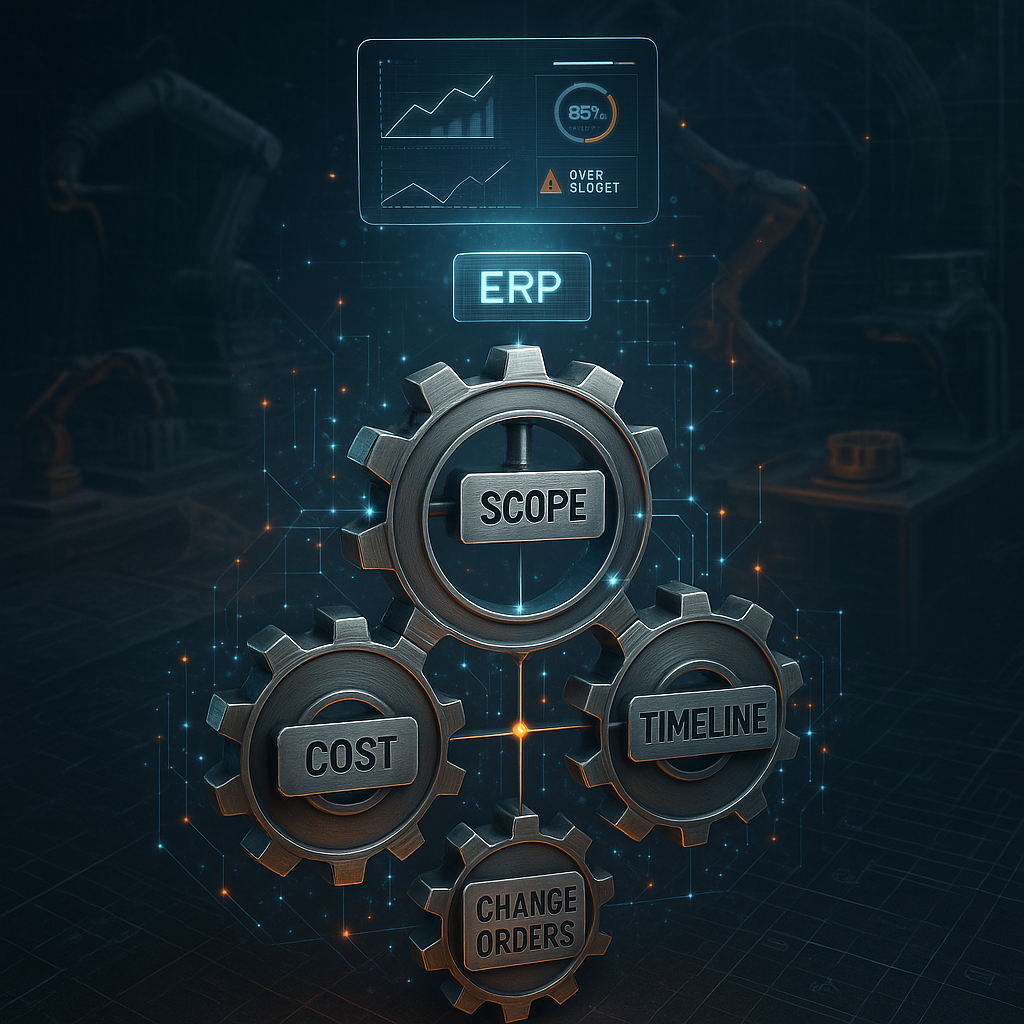Top Cloud-Based ERP Systems for Manufacturing: Best Vendors Compared
If you run a manufacturing operation, you already know the risks: missed ship dates, broken processes, and bloated inventories. In 2026, the...
6 min read
 Blake Snider
:
Sep 10, 2025 1:30:00 PM
Blake Snider
:
Sep 10, 2025 1:30:00 PM
For small and mid-sized manufacturers, every decision around systems and software has a real operational impact. Are your current tools giving you the visibility and control you need to scale efficiently? Or are gaps in your process costing you time, money, and missed opportunities?
According to NetSuite’s 2024 ERP report, more than 80% of businesses that implemented ERP systems for over a year reported positive ROI—a clear signal that the right system can drive measurable outcomes.
This guide is designed to help you select an ERP system that aligns with your manufacturing needs, without the excess cost or complexity of enterprise platforms. We’ll compare five leading solutions, highlight key features to prioritize, and walk through a selection checklist to ensure your next ERP supports growth, not overhead.
For small and mid-sized manufacturers, choosing the right ERP system isn’t just an IT decision. It’s a move that directly affects cash flow, lead times, and customer satisfaction. The right platform connects inventory, production, finance, and sales into one system that supports faster decisions and smoother operations.
Modern cloud-based ERP software enables this without the complexity and cost of legacy enterprise systems. But with so many options, small businesses risk overbuying features they’ll never use or underbuying and hitting limitations too soon.
ERP software promises efficiency, but only when aligned with your day-to-day reality. Small manufacturers often operate leanly, so the right ERP must reduce manual work, improve order accuracy, and support faster turnarounds without increasing overhead. Features like predictive analytics sound impressive, but if they don’t deliver immediate value, they’re a cost, not an asset.
Too many small manufacturing companies either pay for features they never implement or choose lightweight systems that don’t scale. Instead of guessing, map your core workflows like production, inventory, and quoting against system capabilities. Skip global tax tools or complex logistics if you don’t need them. But don’t ignore planning or quality control if growth is in your future.
ERP systems do more than improve internal workflows. They can directly impact customer satisfaction by enabling faster quoting, better delivery performance, and real-time inventory visibility. The best ERP platforms give small manufacturers tools like mobile access, CRM integration, and production dashboards, helping them compete with larger firms without adding headcount.
Whether you’re exploring Odoo ERP, Acumatica Cloud ERP, or Microsoft Dynamics 365 Business Central, the goal isn’t to buy the most advanced system. It’s to choose the best ERP for your specific operation. A successful ERP implementation begins with knowing what you need and what you don’t.
Small and mid-sized manufacturers need ERP systems that improve operations without unnecessary complexity. The best ERP platforms align with your business processes and reduce manual work. They support growth without requiring a large IT team or enterprise budget.
Here’s what to look for when selecting the right ERP system:
Inventory and Production Control
You need real-time inventory tracking, BOM management, and production scheduling. Whether you're in discrete or process manufacturing, the ERP must fit your environment and simplify your workflows.
Real-Time Visibility and Performance Insights
Dashboards should show WIP, order status, and key metrics across your supply chain. Cloud-based ERP software with live alerts and automated reporting helps improve business performance and reduce surprises.
End-to-End Integration
Your ERP should connect accounting, CRM, and sales tools to eliminate data silos. Integrated systems help manage quoting, fulfillment, and cash flow from a single source of truth.
Ease of Use and Fast Deployment
Choose an ERP solution with a simple UI, guided setup, and mobile access. Cloud ERP platforms like Odoo, Acumatica, and Dynamics 365 are built for small businesses and quick rollouts.
Scalability for Growing Businesses
Your ERP must scale with you. Look for modular systems that support expanding product lines, multiple warehouses, or new business models—without costly reimplementation.
Start with your ERP requirements template, clarify business needs, and apply clear ERP selection criteria. Don’t chase features. Choose the ERP system that fits your shop floor, your team, and your long-term goals.
Selecting the right ERP software is one of the most critical decisions a small manufacturing business will make. The right system can streamline operations, unify business processes, and improve performance across production, inventory, and finance. Below are five of the top ERP systems for small manufacturers in 2025, each offering a unique balance of flexibility, cost-efficiency, and fit for real-world manufacturing environments.
Katana is designed specifically for small manufacturing businesses that need clarity, speed, and ease of use. Its cloud-based ERP platform includes real-time inventory control, visual production scheduling, and direct integrations with Shopify, WooCommerce, and Xero.
It’s particularly well-suited for make-to-order or D2C manufacturers that prioritize agility. For teams with limited IT support, Katana offers a clean, intuitive experience and quick time-to-value, making it a smart choice for those replacing spreadsheets or basic MRP tools.
SYSPRO is a strong option for small manufacturing companies that need advanced functionality without the burden of enterprise-scale systems. To see how it compares against other ERP vendors beyond the SME space, check our comprehensive guide to the top ERP systems for manufacturing.
The platform’s flexibility in deployment, whether on-premise, cloud, or hybrid, lets manufacturers scale or modernize at their own pace.
Dynamics 365 Business Central brings Microsoft’s robust ERP capabilities to small and medium-sized manufacturers looking for a scalable, cloud-first solution. It covers financials, inventory, purchasing, and manufacturing workflows while seamlessly integrating with Microsoft tools like Excel, Teams, and Power BI.
While it requires some configuration to fit specific manufacturing processes, Microsoft’s vast partner network provides support for tailoring the platform to various manufacturing environments. It’s a strategic fit for businesses already embedded in the Microsoft ecosystem or planning for steady growth.
Odoo is a flexible, modular ERP system that allows manufacturers to implement exactly what they need, nothing more, nothing less. Whether you start with inventory, MRP, accounting, or CRM, Odoo lets you expand gradually without locking you into unnecessary features.
Its open-source foundation makes it ideal for manufacturers that want control, customization, and a lower total cost of ownership. It can support various manufacturing models, from job shops to process manufacturing, and is an attractive option for companies looking to avoid the rigidity of all-in-one systems.
Acumatica remains one of the leading cloud ERP solutions for scalability, especially for manufacturers with high transaction volumes or plans for rapid expansion. It supports mixed-mode manufacturing, real-time visibility into production and financials, and deep automation across the supply chain.
Unlike user-based pricing, Acumatica uses resource-based licensing, giving growing businesses flexibility as teams expand. For manufacturers seeking long-term scalability and a unified platform for manufacturing, distribution, and finance, Acumatica is one of the best ERP solutions available.
| ERP System | Best Fit | Starting Price | Deployment | Key Features |
|---|---|---|---|---|
| Katana | Small shops, made-to-order | $179/month | Cloud ERP | Visual scheduling, inventory control |
| SYSPRO | Process and discrete SMEs | Varies | Cloud / On-premise | Manufacturing depth, compliance, traceability |
| Dynamics 365 Business Central | Scaling small to mid-sized manufacturers | $70–100/user/month | Cloud ERP | Microsoft integration, customization options |
| Odoo | Budget-conscious, modular needs | $24/user/month | Cloud / Self-hosted | Open-source ERP, flexible modules |
| Acumatica | High-growth manufacturers | Varies | Cloud ERP | Usage-based pricing, real-time visibility |
This snapshot covers the leading options for small manufacturers. Katana is built for small shops, SYSPRO adds depth for compliance-heavy operations, Dynamics 365 Business Central connects finance and supply chain, Odoo keeps costs low with modular flexibility, and Acumatica delivers scalability with usage-based pricing.
When comparing ERP vendors, prioritize total cost of ownership and process alignment. Choose systems that can adapt as your manufacturing needs evolve. For some, lightweight cloud ERP solutions are the best fit; for others, platforms like SAP Business One or Epicor ERP provide the needed depth.
In 2025, small and medium-sized manufacturers will have more ERP options than ever. The right ERP system is the one that strengthens your operations today and positions your business to grow tomorrow.
Selecting an ERP system is a long-term investment. The wrong choice can lock a manufacturing business into costly delays and failed rollouts. The right ERP solution, however, streamlines business operations, delivers actionable insights, and supports growth. To avoid buyer’s regret, evaluate the vendor as carefully as the software itself.
Go into vendor negotiations with specifics, not assumptions. Key questions include:
Will this ERP scale with your 3–5 year growth plan?
What’s included in the base license versus add-ons?
How much of the ERP implementation is self-service versus vendor-led?
What are the total cost and support commitments beyond year one?
Document the answers. Misaligned expectations during the selection process are a leading cause of failed ERP projects.
A demo should show how the system handles your workflows, not just canned examples. Test scenarios such as creating a sales order, scheduling a production run, or generating a manufacturing ERP report. Involve end users, not just management—successful ERP implementation depends on usability and adoption at every level.
Vendors that dodge questions about total cost of ownership, implementation timelines, or case studies in your industry are red flags. Be wary of one-size-fits-all pitches; small manufacturing companies need ERP software solutions tailored to their processes, whether discrete manufacturing, process manufacturing, or mixed-mode operations.
Even the best ERP software fails without strong support. Ask vendors how they handle data migration, user training, and post-launch assistance. Favor ERP vendors that offer role-based training, clear documentation, and responsive support. Effective onboarding reduces risk, lowers long-term costs, and makes a new ERP system a tool your team will actually use.
Trusted partners often make the difference between a smooth rollout and a stalled project. For manufacturers considering IFS ERP, Astra Canyon offers implementation support tailored from planning through go-live.
The best ERP system is the one that fits your processes, supports growth, and delivers value without unnecessary complexity. For small manufacturing businesses, that means focusing on usability, total cost of ownership, and scalability.
Your ERP selection process should center on clarity. Define your business needs, compare vendors carefully, and choose the right ERP system that strengthens supply chain visibility, improves operations, and drives measurable results.
For manufacturers with more complex requirements, IFS ERP is a compelling option. Astra Canyon Group is a trusted IFS implementation partner that helps small and mid-sized manufacturers achieve successful ERP implementation with long-term support.
Schedule a call with Astra Canyon to explore how IFS ERP can be tailored to your business.

If you run a manufacturing operation, you already know the risks: missed ship dates, broken processes, and bloated inventories. In 2026, the...

Project-based manufacturing runs on control, including scope, cost, and delivery. Without the right ERP, that control breaks down fast. Is your team...

Are you confident your ERP system can keep pace with what’s coming? Manufacturers are already rethinking what ERP should do, moving beyond...